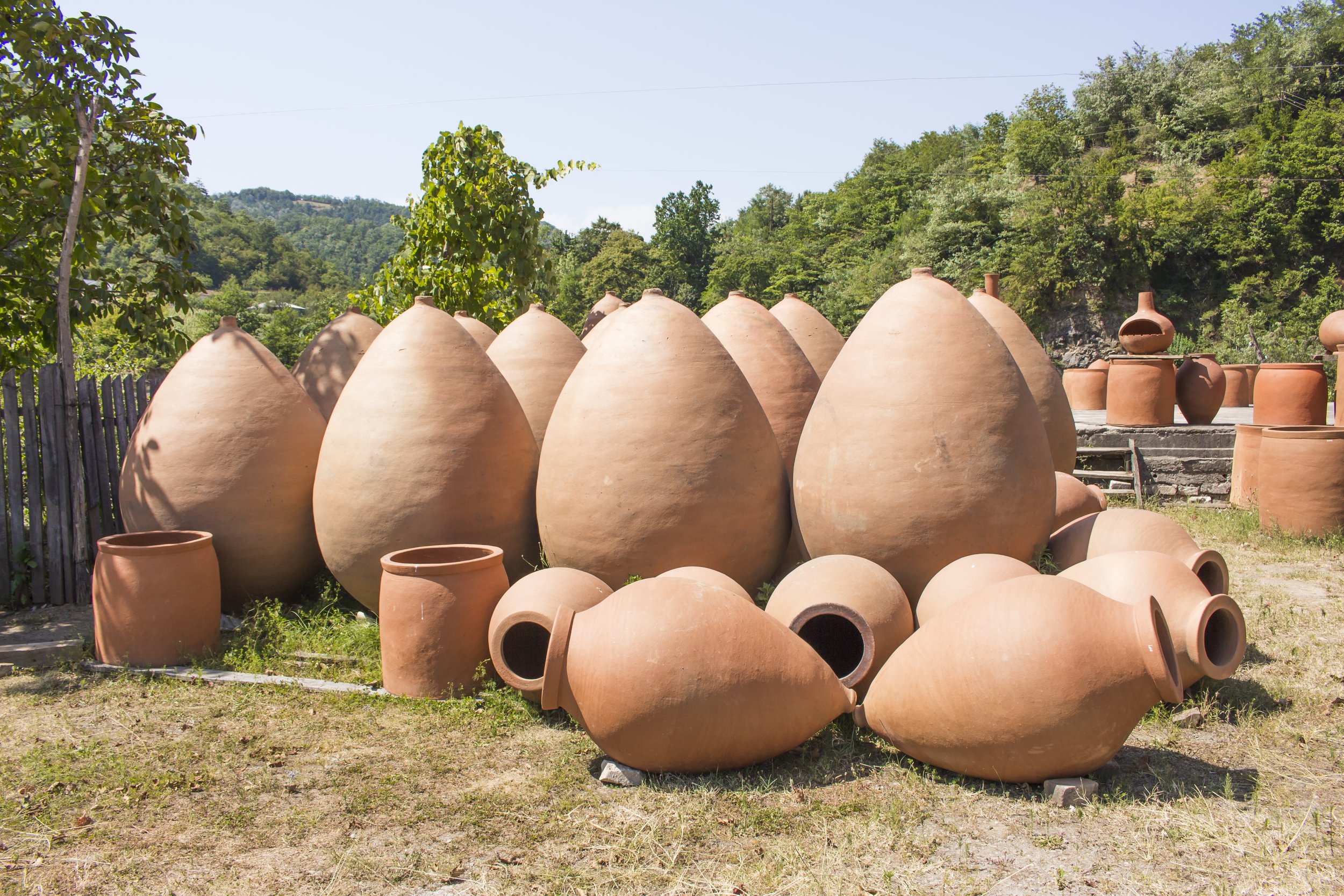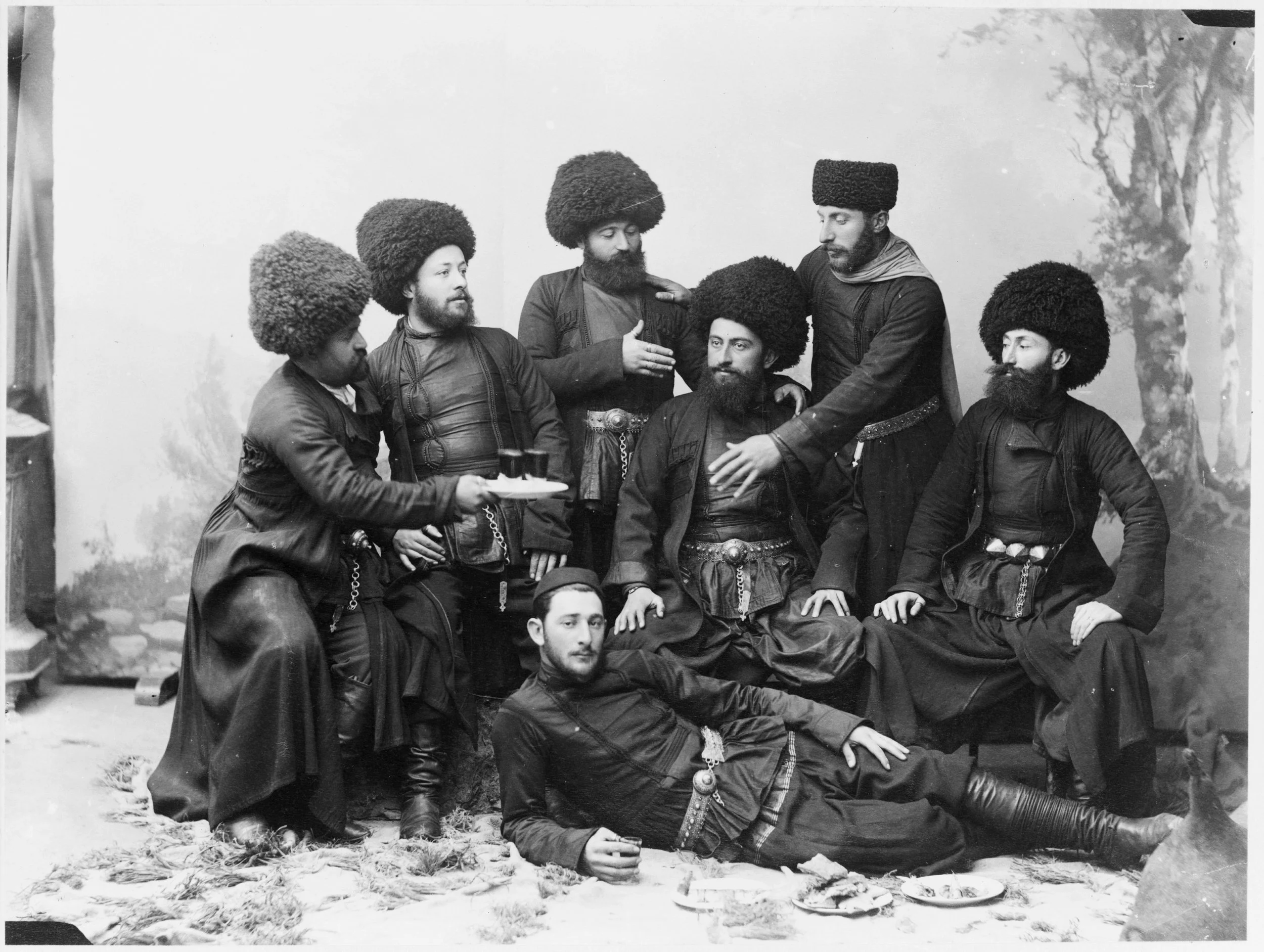Gaumarjos! The Ultimate Guide to Surviving Your First Georgian Supra
Is your body ready for a Georgian supra? Photo by Irma Sharikadze.
We were warned upon arrival in Georgia, a mountainous ex-Soviet country famous for existing next to Russia.
We, being a fresh crop of volunteers, carted off from our Anglophone countries to teach English in rural villages.
Warned, being advice from our Georgian cultural guides about Georgia’s feasting tradition, the supra.
“There will be food,” they said during volunteer orientation. “There will be wine. Both will never stop and you won’t be allowed to leave.”
My fellow volunteers and I took the warning in jest. Afterall, where was the harm in a little booze and grub?
Three months into my residence in Georgia and with four supras under my belt, I learned.
One does not merely attend a Georgian supra.
You survive it.
What is a supra?
Meaning “tablecloth” in Georgian, supra is the name for traditional Georgian feasts.
The supra, however, is more than just joining your friends for dinner.
As a capstone of Georgian social culture, the supra is an 8,000-year-old tradition, originating with the birth of Georgian winemaking. They are held for all occasions – from birthdays to marriages to funerals – and are notable for their use of structured toasts. They are also hours-long affairs, often carrying on until after midnight.
There are two types of supra; the festive supra, called a keipi, and the somber supra, called kelekhi. As a visitor to Georgia, you will likely encounter the festive supra.
How can you participate in a supra?
Short-term visitors to Georgia have two options for experiencing a supra.
The first is via the tourist track, through pre-booked holiday packages and restaurant meals. The second is in the wild, through an invite from a local. As far as differences go, pre-booked supras come with English-speaking guides and plenty of hand-holding through Georgia’s dizzying social codes. A supra through an invite, though more authentic, means forgoing translators and guidebooks, for better or for worse.
Your preference will depend on your risk tolerance and whether or not you feel lucky.
Understanding the Supra
The Tamada (toastmaster)
A feast isn’t a feast without food. And a Georgian feast isn’t a supra without a tamada, or toastmaster.
Typically elected by the feasting party or venue host, the tamada is almost always a man (I, a lady, for example, have been a tamada). Gender, however, has nothing to do with the makings of a great tamada, as a successful toastmaster must be adept at maintaining the energy of the room, a clever wordsmith, and an absolute unit when it comes to doling out and consuming large amounts of alcohol.
Toasts
If attending a supra in a local home, wine is typically drunk from Soviet-era crystal glassware. Think the above glasses, but smaller. Photo by Jacki Drexler on Unsplash
Supras revolve around toasts. So much that when the tamada proposes a toast, all action in the room – eating, talking, and drinking – stops. During a toast, the tamada speaks at length on a topic, to raised glasses by the guests.
Only after the tamada’s conclusion do the guests drink, by shouting “Gaumarjos!” (cheers) before completely draining their wine glasses’ contents, usually in order around the table.
Notice how I said entire glass? That’s because downing your drink in full is a sign of respect in Georgia. If this sounds intimidating, don’t worry – wine glasses are small and toasts are evenly dispersed throughout the meal. Georgian women and foreigners of all genders do not face the same social drinking expectations as Georgian men.
Toast subjects have no limits, however, tradition mandates select topics. For example, the tamada always opens a supra with a toast to Georgia, with subsequent toasts about the following:
The harvest. Typically heard during harvest season (varies by crop and region) in rural areas. For example, if in Kakheti in October, you might make a toast to grapes, whereas is you’re in Adjara in December, you might make a toast to mandarin oranges, Adjara’s signature crop.
Deceased loved ones. Self-explanatory.
Peace. Like many nations in the New East (former Soviet Union), Georgia’s road to independence was long, tumultuous, and bloody. Toasts to peace are made in light of this.
God. Religious belief is an integral part of Georgian culture and identity. Toasts to God include prayers for the Lord’s blessing.
Honored guests. This includes you, the country you hail from, and its leaders (regardless of your political orientation).
Women. If your tamada is feeling cheeky, you might encounter toasts celebrating beautiful ladies. If you’re single, this toast might include wishes for you to find love and get married. If partnered, this toast might include wishes for a happy marriage and lots of children (see below).
Motherhood and children. Toasts celebrating the gift of life and the family unit.
Stalin. A wild card toast, likely heard from elderly tamadas or if the supra takes place in Stalin’s hometown, Gori. Take this one with a smile and a nod, regardless of your feelings towards Uncle Joe.
Feeling Horny?
If joining a supra on a truly special occasion, your host might whip out a khantsi (ყანწი), or ritual drinking horn fashioned from goat or bull horns. Though the true meaning of the khantsi is unknown, its useage arose with the advent of Georgian winemaking, as a way to honor Georgia's aforementioned specialty. When accepting a drink from the kantsi, remember not to set it down until you've completely downed its contents.
An example of the khantsi, Georgian drinking horn.
Wine
The pièce de resistance and self-renewing resource of the supra. Wine.
As the birthplace of winemaking, Georgia is home to over 500 indigenous grape varieties. And though wineries are concentrated in Georgia’s eastern Kakheti region, virtually every Georgian family has their own wine recipe.
Thanks to a unique brewing process, where wines are aged in underground clay vessels called qvevri, Georgian wines possess crimson and amber hues and a signature astringent taste.
Toasts are always made with wine during a supra. Beer is for your enemies.
Clean, empty qvevri before being filled with wine and buried underground for wine maturation.
Gender
Though Georgia’s capital, Tbilisi, is home to vibrant alternative communities, Georgia is still by-and-large a conservative country, with traditional gender roles to boot.
When applied to the supra, men take center stage, as toastmasters and active participants in tableside conversations and drinking games. Women, however, are relegated to the kitchen during meal preparation and to the background during the supra itself, as servers and passive participants. In extreme cases (we’re talking ultra-traditional isolated highland villages in places like Svaneti and Tusheti), women don’t participate in supras beyond the kitchen at all.
As a guest, you’ll be largely exempt from Georgia’s gender roles. This, however, doesn’t mean you shouldn’t be conscious of the patriarchal structures at play during the supra.
Food
Now that the supra’s social dynamics are under the table, let’s get to the bread and butter.
When it comes to cuisine, Georgia isn’t nicknamed the “Italy of the Caucasus” for nothing. And since I can’t find an adjective to describe Georgian food that isn’t cliché, I’ll let the following post do the talking (spoiler alert: the best Georgian foods come from Adjara, a southwestern region bordering the Black Sea).
Supra Do’s
A modern supra; can you name any of the foods in this picture?
Dress up
Georgians are snappy dressers by default; they turn the fashion up even louder for the supra. This means ironed shirts, fancy perfumes, and spotless leather shoes. Guests are encouraged to do the same, especially if invited to a supra in the wild.
When in doubt, follow the tamada
There will be times when you feel confused during the supra. This is normal. Follow the tamada’s lead when you feel lost.
Try everything
Georgians take hospitality seriously, and declining a dish could be taken as an insult by your host, even if you mean no harm. Specialty and religious diets withstanding, aim to try everything.
Regarding food allergies, inquire with the host before consuming any dish you’re unsure about, as nuts, gluten, and dairy are Georgian cuisine mainstays. If practicing a religious diet, inform your host; Georgians tend to be accepting of other religions.
Know your limits
Drunkenness isn’t a good look in Georgia. In fact, it’s frowned upon. No matter how much wine is served, always be in control of your alcohol consumption. Pace yourself and pad your drinks with food and water. Remember, it’s okay to decline drinks once you’ve reached your limit, by turning your wine glass upside down or informing the tamada that you feel sick. If you are sober or follow religious rules around alcohol, let the host know before the first toast.
Be conscious
If attending a supra in the wild, know that many hours (days, in some cases) of labor went into preparing the meal, as dishes are often made from scratch (and over a woodburning stove, if invited to a rural supra). Given Georgia’s high poverty and food insecurity rates, also know that a feast for you today could mean bread and rice tomorrow for the host family. Be conscious of this and always thank your hosts. In fact, thank them multiple times.
Be curious
Georgians are proud of their traditions. Feel free to ask questions about Georgia’s history, language, and culture. Ask how the food and wine were prepared. Try learning some Georgian words. Your hosts will love you if you do.
Come Hungry
If you know you have a supra to attend in the evening, eat lightly throughout the day. You’ll want plenty of stomach room to spare.
Old school cool; a Georgian supra, circa late 19th century.
Supra Don’ts
Interrupt the tamada
This is the ultimate sin at a supra.
Bite off more than you can chew
While your Georgian hosts will ensure you’re well-fed, satiation should not be painful or vomit-inducing. Resist the urge to load up your plate at the beginning of the night. Small portions, eaten slowly over a several-hour period, are your friends.
Bring extra food
If invited to a local supra, the only items you should bring are yourself and an odd number of flowers for the host (even numbers of flowers are for funerals in former Soviet countries). Avoid bringing food of your own, as hosts use the supra to demonstrate how proficient they are at providing.
Partake in drinking games
Supras are no stranger to drinking games, however, abstain from getting involved. You will lose. And probably get alcohol poisoning…
Talk about sensitive topics
Unless you know your host Georgians very well, avoid discussing the 2008 Russian invasion, feminism, LGBTQ+ rights, and the current situation in Abkhazia and South Ossetia. Emotions run high when these topics are brought up in Georgia, and chances are your conversational counterparts might have opinions you don’t want to hear.
Do you plan on participating in a supra during your visit to Georgia? If you’ve been to a supra before, what was your favorite Georgian food?






